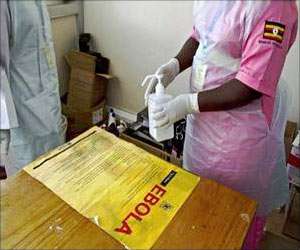
US airports also announced plans to begin enhanced screening of travelers from the west African nation.
Mali has been scrambling to prevent a minor outbreak from turning into a major crisis after the deaths of a Guinean imam and the Malian nurse who treated him in the capital Bamako.
A friend who had visited the imam in the Pasteur clinic also died of probable Ebola and a two-year-old child died from the disease in an unconnected case in the western town of Kayes in October.
"The number of contacts followed by health services amounts to 442. They have all been placed under observation for health control," Samba Sow, of the Ebola emergency operations center, said in a statement late Sunday.
Teams of investigators have been tracking health workers and scouring Bamako and the imam's village of Kouremale, which straddles the Mali-Guinea border, for people who could have been exposed.
Advertisement
The virus is estimated to have killed around 70 percent of its victims across west Africa, often shutting down their organs and causing unstoppable bleeding.
Advertisement
US authorities on Monday began enhanced Ebola screenings of travelers from Mali, adding to measures already in place in for travelers from Liberia, Sierra Leone and Guinea.
The US Centers of Disease Control and Prevention, in a joint statement with the Department of Homeland Security, said Mali was added to the list "because there have been a number of confirmed cases of Ebola" there in recent days.
"A large number of individuals may have been exposed to those cases," the statement said.
"The action is warranted as a precaution due to the possibility that other cases of Ebola may emerge in Mali in the coming days," the statement said.
The United States said about 15-20 travelers depart Mali each day en route to the United States.
Those arriving will be checked for fever and subject to the 21-day monitoring and movement protocols already in effect for people coming from Liberia, Sierra Leone and Guinea.
The monitoring includes mandatory twice daily temperature and symptom checks in coordination with state and local public health authorities.
The enhanced Ebola screenings are carried out at five US airports: New York's JFK, New Jersey's Newark airport, Washington Dulles, Atlanta and Chicago.
- Surgeon is mourned -
In Nebraska, medical staff mourned the death of a surgeon infected in Sierra Leone who died about a day after being airlifted to a specialized US hospital.
Martin Salia, 44, was a US resident who had been working at a hospital near Freetown. The married father of two was suffering multiple organ failure by the time he arrived in the United States on Saturday.
"Dr. Salia was extremely critical when he arrived here, and unfortunately, despite our best efforts, we weren't able to save him," said Phil Smith, medical director of the biocontainment unit at the University of Nebraska Medical Center.
Salia and his wife, Isatu, lived in New Carrollton, Maryland, a suburb of the US capital Washington. They have two children, age 12 and 20.
"We're very grateful for the efforts of the team led by Dr. Smith," she said in a statement.
"In the short time we spent here, it was apparent how caring and compassionate everyone was."
Salia is seen in a video distributed by United Methodist Kissy Hospital outside Freetown, where he worked, describing why he wanted to treat patients in Sierra Leone.
"I took this job not because I want to, but I firmly believe it was a calling," he said.
"I strongly believe that God has called me here."
Source-AFP










